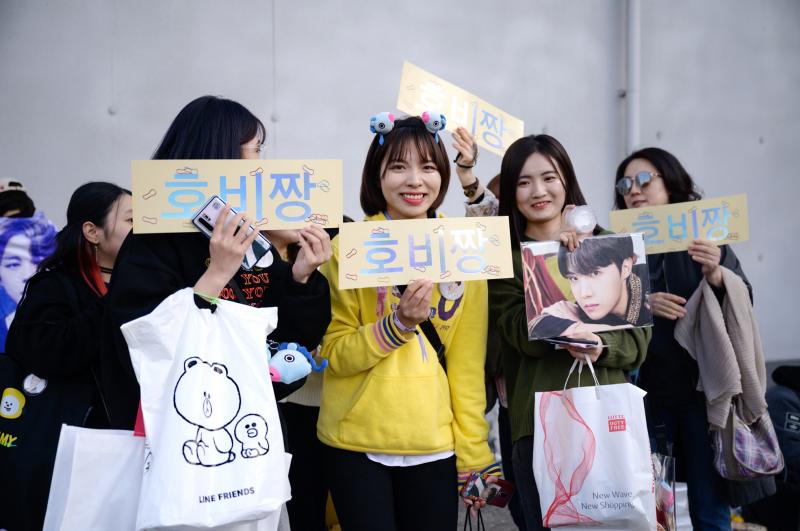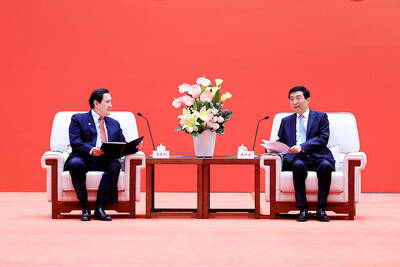Legions of K-pop fans and TikTok users are taking credit for upending Donald Trump’s weekend rally after block-reserving tickets with no intention to attend an event that was beset by an embarrassingly low turnout.
Prior to the event in Tulsa, Oklahoma — hyped as a major relaunch ahead of the November election — Trump’s campaign chairman tweeted that more than a million tickets had been requested.
But according to the local fire department, just 6,200 people attended.

Photo: AFP
Viral posts on TikTok and Twitter revealed that plans to reserve tickets en masse had been circulating for days, racking up hundreds of thousands of views.
One video urged fans of the South Korean “K-pop” sensation BTS — one of the world’s most popular bands, with more than 21 million Twitter followers — to participate in the plot.
“Oh no, I signed up for a Trump rally, and I can’t go,” said one woman who coughed sarcastically in a separate TikTok video.
Brad Parscale, Trump’s campaign manager, blamed “radical protestors” for “interfering” with the rally.
But Alexandria Ocasio-Cortez, the 30-year-old leftist congresswoman from New York, clapped back: “You just got ROCKED by teens on TikTok.”
“KPop allies, we see and appreciate your contributions in the fight for justice too,” she added.
‘SOCIALLY CONSCIOUS FANS’
Though ascertaining the viral campaign’s concrete impact on the rally’s attendance is near impossible, the action spotlighted K-pop’s tradition as a politically engaged fandom.
Just in the past month, fans of the globally dominant pop genre — which was born approximately 25 years ago in South Korea — co-opted the hashtag #WhiteLivesMatter by flooding it with K-pop-related imagery to drown out racist tweets.
“K-pop has a culture of being responsible,” said CedarBough Saeji, an academic expert of the genre based out of Indiana University. “K-pop fans in general are outward-looking, socially conscious people and K-pop in the United States is very heavily supported by people of color, by people who identify as being LGBTQ,” she said.
K-pop superstars, known as idols, are expected to be role models, Saeji explained, and often inspire ardent fandoms.
Though adorers would often send gifts to their favorite performers, many stars ask support be sent to charities instead.
After BTS dropped US$1 million behind the Black Lives Matter movement, a fan collective charity — known as One in An ARMY — raised another million to match.
“BTS songs have played a role in motivating us to be confident with ourselves, to be kind to others and to be there for one another,” said Dawnica Nadora, a 27-year-old volunteer for the charity’s US arm.
In 2018, the powerhouse boy band addressed the UN, urging young people to engage their own convictions.
Saeji pointed to a “messaging of positivity” behind the current activism from fans.
“K-pop attracts people who like this kind of music but also who want to make the world a better place.”
‘POWERFUL FLEX’
That socially conscious attitude, coupled with internet savvy, makes the K-pop fandom a mighty force.
“Fans are online all the time... K-pop organizers are primarily on Twitter,” said Saeji, who said fans’ understanding of internet algorithms makes them a powerful group when it comes to online organizing.
According to the social media platform, #KpopTwitter posted a record 6.1 billion tweets in 2019.
“We are very lucky that ARMYs support one another, despite often being thousands of miles away from each other,” volunteer and BTS fan Nadora said, using the nickname for fans of the group.
“Most of us have never met each other in person, but what makes us work as a unit is that we respect each other, and help each other to improve.”
And though some political analysts cast the viral effort to rain on Trump’s parade as just a prank, a number of commentators including Saeji said it amounts to much more.
“They corrupted all of this data that the Trump campaign was trying to collect,” she said. “They basically showed the campaign, you’re not going to be able to trust any of your numbers in the future.”
“That is a powerful flex.”
Saeji also said the action gave youth online evidence of their own agency to provoke change.
“If they believe they can make a difference, they’re also going to believe that voting is worthwhile.”

The canonical shot of an East Asian city is a night skyline studded with towering apartment and office buildings, bright with neon and plastic signage, a landscape of energy and modernity. Another classic image is the same city seen from above, in which identical apartment towers march across the city, spilling out over nearby geography, like stylized soldiers colonizing new territory in a board game. Densely populated dynamic conurbations of money, technological innovation and convenience, it is hard to see the cities of East Asia as what they truly are: necropolises. Why is this? The East Asian development model, with

Desperate dads meet in car parks to exchange packets; exhausted parents slip it into their kids’ drinks; families wait months for prescriptions buy it “off label.” But is it worth the risk? “The first time I gave him a gummy, I thought, ‘Oh my God, have I killed him?’ He just passed out in front of the TV. That never happens.” Jen remembers giving her son, David, six, melatonin to help him sleep. She got them from a friend, a pediatrician who gave them to her own child. “It was sort of hilarious. She had half a tub of gummies,

The wide-screen spectacle of Formula One gets a gleaming, rip-roaring workout in Joseph Kosinski’s F1, a fine-tuned machine of a movie that, in its most riveting racing scenes, approaches a kind of high-speed splendor. Kosinski, who last endeavored to put moviegoers in the seat of a fighter jet in Top Gun: Maverick, has moved to the open cockpits of Formula One with much the same affection, if not outright need, for speed. A lot of the same team is back. Jerry Bruckheimer produces. Ehren Kruger, a co-writer on Maverick, takes sole credit here. Hans Zimmer, a co-composer previously, supplies the thumping

There is an old British curse, “may you live in interesting times,” passed off as ancient Chinese wisdom to make it sound more exotic and profound. We are living in interesting times. From US President Donald Trump’s decision on American tariffs, to how the recalls will play out, to uncertainty about how events are evolving in China, we can do nothing more than wait with bated breath. At the cusp of potentially momentous change, it is a good time to take stock of the current state of Taiwan’s political parties. As things stand, all three major parties are struggling. For our examination of the